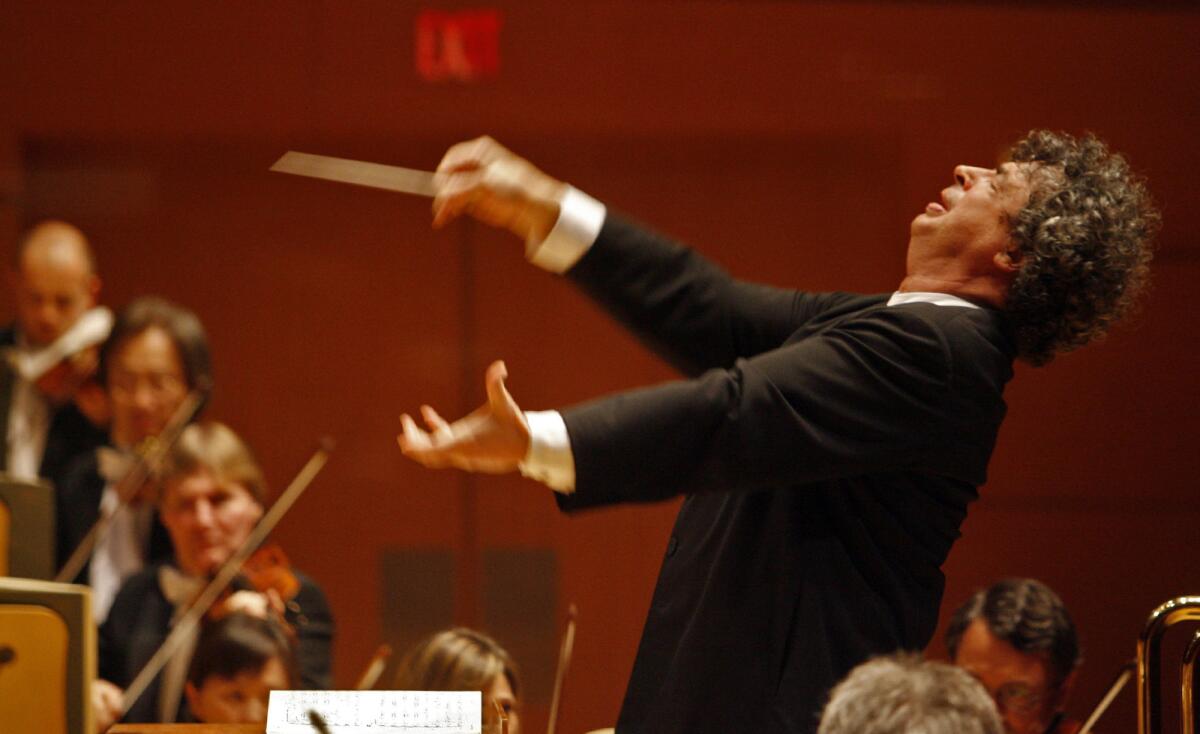Review: L.A. Phil and Semyon Bychkov achieve a musical summit with ‘Alpine Symphony’

Semyon Bychkov conducting the Los Angeles Philharmonic in April 2010 at Walt Disney Concert Hall. He’s back this weekend.
“The Alpine Symphony” doesn’t come around very often. One reason is scale. Richard Strauss’ monumental tone poem requires an extravagant orchestra of 150.
Another reason is taste. A spectacular musical description of surmounting an Alpine peak, the score can also, in the wrong hands, seem like the peak of musical mishigas.
A century ago, Strauss accomplished with a symphony orchestra what now requires 3-D Imax, Oculus or, at the very least, recreational marijuana. The pitfalls in performance are not dangerous symphonic terrain but the temptation for cheap thrills.
SIGN UP for the free Essential Arts & Culture newsletter >>
Semyon Bychkov conducted an ecstatic performance with the Los Angeles Philharmonic in Walt Disney Concert Hall on Thursday night. Last week, he had led a Brahms-centered program with the New York Philharmonic, where, unlike in Los Angeles, the 62-year-old Russian conductor is not a regular.
But he may become one. He is said to have so won over the players that the New York Philharmonic has added Bychkov’s name to the short list in its search for a new music director. The L.A. Phil “Alpine” is an excellent example of why.
The 50-minute score, in 22 descriptive sections, begins with a glorious sunrise following a pregnant night. There’s the enthusiasm of the initial climb. Forest, waterfall, flowers and a glacier reveal Mother Nature in all her pastoral and — when one takes a wrong turn — disquieting glory.
The summit is one of the dazzlingly loudest moments in all the standard symphonic literature. It must have been too much on Thursday for three young children sitting behind stage who scurried out. The descent becomes more meditative and includes what may be the most realistic evocations of a storm in symphonic literature. When night once again arrives, the world seems changed.
The “Alpine” appears to be on a seven-year cycle with the L.A. Phil. In 2001, Roberto Abbado treated the occasion as though he were conquering Everest. In 2008, Gustavo Dudamel conducted the score as a great adventure but not a goal-directed one. He was the seeker, bringing a fresh eye to everything, infectiously sharing his astonishment with every aspect of a great mountain.
Bychkov tried something chancier. He scaled not Mt. Strauss but the composer’s psyche. Thursday’s performance was 100 years and one day after Strauss had led the world premiere in Berlin. This served as a reminder that “The Alpine Symphony” could be heard by its first audience as a spiritual exaltation of Germany’s effort in World War I.
In a short feature about the “Alpine” on “All Things Considered” on Wednesday, Bychkov explained that he considers the mountain a metaphor for life and our spiritual growth. There can be a lot of hooey in Strauss’ life of the mountaineer. Passionate love music in the style of “Der Rosenkavalier,” for instance, serves as all-purpose rapture.
But Bychkov really does find a spiritual center. He balances the exceedingly large forces — brass everywhere on stage and off, a large percussion section, big organ, an Alpine-sized mountain of strings — with exquisite grace and sophistication.
The point here of reaching the summit was not the view, but to get closer to the stars. The storm was a catharsis. And all that “Rosenkavalier” sweetness was — take it or leave it — a rhapsody of unadulterated sentiment. The L.A. Phil, in the mood for splendor, took it all.
Whatever precedes “The Alpine Symphony” on a program has the unenviable job of prologue. On this occasion it was Mendelssohn’s Violin Concerto in E minor. Maybe the most overplayed piece in the repertory, the L.A. Phil programmed it at the Hollywood Bowl in July. The New West Symphony undertakes it next week; the Los Angeles Chamber Orchestra in December.
Even so, Bychkov’s soloist, Renaud Capuçon, managed to make the inescapable concerto fit the occasion by finding a way for predictable music to sound not only unpredictable but also risky.
The French violinist’s tone is slender, and he glided through the score with tremendous speed and agility but also with considerable refinement, treating the solo part as tightrope act. That combination can keep a listener on the edge of his or her seat.
The feeling was that Capuçon was somehow capturing the energy of Mendelssohn, that his tightrope was a high-tension wire. Through ideal orchestral balances, Bychkov maintained the safety net to let all that happen.
Follow me on Twitter @markswed
------------
Semyon Bychkov conducts the Los Angeles Philharmonic
Where: Walt Disney Concert Hall, 111 S. Grand Ave., Los Angeles
When: 2 p.m. Sunday
Cost: $26.50 to $195.50
Info: (323) 850-2000 or www.laphil.org
More to Read
The biggest entertainment stories
Get our big stories about Hollywood, film, television, music, arts, culture and more right in your inbox as soon as they publish.
You may occasionally receive promotional content from the Los Angeles Times.











